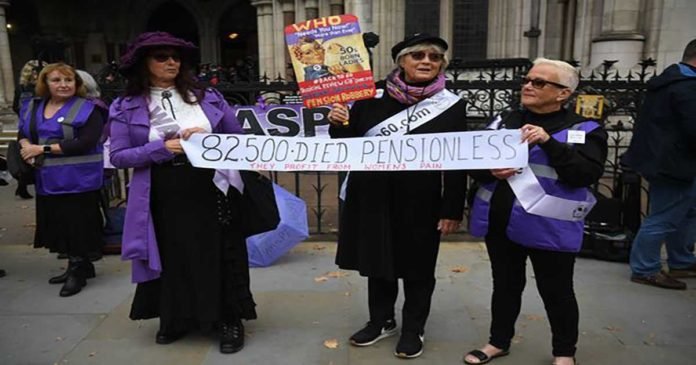Campaigners have lost a significant legal battle against the government’s handling of the rise in women’s state pension age.
The retirement age for women rose from 60 to 65, in line with men, and will go up to 66 by 2020, and to 67 by 2028.
Women born in the 1950s claim the rise is unfair because they were not given enough time to make adjustments to cope with years without a state pension.
They argued the changes were discrimination, but judges disagreed.
In a summary judgement, the two judges said the original pension ages of 60 for women and 65 for men were “direct discrimination in favour of women which reflected the circumstances of the day and created a relative disadvantage for men.”
They added: “This legislation does not treat women less favourably than men in law, rather it equalises a historic asymmetry between men and women and thereby corrects historic direct discrimination against men.”
And the judges said the government, and previous governments, had “engaged in extensive consultation with a wide spread of interested bodies”.
They concluded: “The court was saddened by the stories contained in the claimants’ evidence.
“But the court’s role was limited. There was no basis for concluding that the policy choices reflected in the legislation were not open to government. In any event they were approved by Parliament.”
The case had argued the Department for Work and Pensions (DWP) “discriminated against them on the grounds of age, sex, and age and sex combined” and claimed they were not given adequate notice to adjust.
Addressing a court packed with supporters at a hearing in June, Michael Mansfield QC said “roughly 3.8 million” women had been affected by the changes.
He said 1950s-born women were not told about the changes “until shortly before” they turned 60, which caused “significant detriments”.
He added they had already suffered “considerable inequalities in the workplace” as a result of “historical factors and social expectations”.
A BackTo60 letter to the Prime Minister in August said the change caused a “great ordeal” to many of the 3.8million women affected and demanded a “swift response”.
Sir James Eadie QC, representing the DWP, argued in the original hearing that the changes were intended “to equalise the state pension age between the sexes”.
He added they were “to ensure intergenerational fairness as between those in receipt of state pensions and the younger taxpayers funding them”.
He said the aim of raising the pension age to 66 was also to “make pensions affordable … and to control government expenditure at a time of great pressure on public finances”.
Behind the case.
Up until 2010, women received their state pensions at the age of 60 but that has been rising since then. While most campaigners support pension age equality, they argued that the government was discriminatory in the way it has introduced it.
The result has been that some women who thought they would retire and receive a state pension at 60 found that they would have to wait longer – for some a wait of more than five years. That resulted in financial hardship for many.
Those affected were born in the decade after 6 April, 1950, but those born from 6 April 1953 were particularly affected and have been the focus of much of the campaign.
In June, the judicial review in the High Court heard the claim from two members of the Backto60 group who said that not receiving their state pension at the age of 60 had affected them disproportionately.
They argued that many women took time out of work to care for children, were paid less than men and could not save as much in occupational pensions, so the change had hit them harder.
It is estimated that 3.8 million women were in this position, with some potentially losing out on more than £40,000.
The Backto60 group is seeking repayment of all the pensions people born in the 1950s would have received if they had been able to retire earlier. It argues that the speed of the change and what it calls the lack of warnings has disadvantaged millions of women.
However, the government has estimated that a reversal of the pension changes in the Acts of Parliament of 1995 and 2011 would cost £215bn over the period 2010-11 to 2025-26.
About £181bn of that would be money potentially owed to women and the rest to men.
It has said the move to make the state pension age the same for men and women was a “long-overdue” move towards gender equality, and had been clearly communicated to those affected.
On the delivery of the verdict women shouted ‘shame on you’, demanded Boris Johnson intervene and warned they could appeal over rises that have hit millions of women born in the 1950s
This is a "Pay as You Feel" website Please help keep us Ad Free.
You can have access to all of our online work for free. However if you want to support what we do, you could make a small donation to help us keep writing. The choice is entirely yours.
























